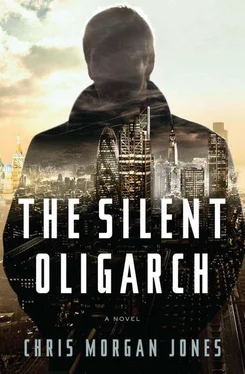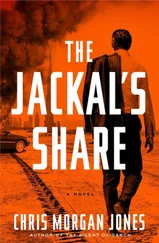“So what’s wrong with Lock? Why can’t he cut it?”
“Listen, I may be wrong about him. He is smart enough, a decent lawyer, but he just doesn’t look the part.” Onder thought for a moment, all the while looking hard at Webster. “Do you know what it is? He’s not a shit. He’s too nice. He is deluded, yes, petty probably, limited, but not a shit. To survive in that world you have to be really hard or really stupid. Lock is pretty clever and soft. Much too soft. He would like to be a part of that world but deep down he doesn’t believe it. Maybe not even that deep.”
Webster nodded; this rang true. Experience told him that few of the Locks of this world had complete faith in their own myth. Another question sat waiting to be aired, and for a moment he considered whether he should ask it. Perhaps it simply wasn’t relevant.
“How nasty is Malin?”
“What do you mean?”
“How ruthless?”
“You mean, does he hurt people?”
“Yes.”
Onder smiled and thought. “To protect himself, maybe. To get ahead, I doubt he has needed to. He’s of the old school. I shouldn’t think he fears justice.”
A sensible, balanced answer. In truth it was no more than Webster knew already.
They talked a little more, but he had enough. He knew now that this case would come down not to a story, a lead, a document, but to a man. It all came down to Lock. He was Malin’s great weakness. Turn him, and you would not only have the perfect witness but leave Malin unmanned and exposed.
“Would you be prepared to be a witness?” Webster asked Onder when they were done.
Onder looked at him and thought for a moment. “Against Malin, yes. For Tourna, I am not sure. Maybe. Let me think.”
“And how about doing a little work for me?”
Onder gave another smile, and held it for a moment. “Have you ever investigated me?”
“Remarkably, no. Why?”
“I was thinking that then I could be subject, client and source. A true honor that would be. What did you have in mind?”
“I might like you to have a word with Richard Lock.”
ONE OF THE THINGS THAT Webster enjoyed about no longer being a journalist, and not being a proper spy, was that he spent time with his family. He guarded that time diligently. Hammer was always on call; his phone was never switched off. He liked nothing better than to be called in the middle of the night because that meant something interesting was happening. But Webster would happily turn his phone off at six o’clock every evening and leave it in some dark drawer all weekend. Eventually Hammer had forced him to have it switched on every day until nine, Webster reluctantly conceding that if a client was good enough to give you money he had a right to talk to you when he wanted. But he still resented having to answer the thing, as he resented client dinners or breakfast meetings or trips that ate into weekends. He had an old-fashioned, sometimes indignant sense of the distinction between work and rest.
When his phone rang that Sunday, then, he was inclined not to answer it. The clear, cold weather of the previous two days had given way to low, dark cloud and a closeness that Webster found enervating. He, Elsa and the children were in the playground. Daniel was taking handfuls of wood-chippings from under the climbing frame and putting them in three neat piles by a bench. He had shed his coat and was going about his work with concentration, squatting on his thick toddler’s legs, standing, walking, squatting again. Webster watched him, fascinated by his determination. That was proper work. Elsa was on the seesaw, forcing her seat abruptly into the ground so that Nancy lifted clear off hers into the air. Nancy laughed each time, a conspiratorial chuckle.
His phone buzzed in his pocket. The caller came up as unknown and in that moment he imagined half a dozen conversations he didn’t want to have. Apologizing to Elsa he walked a few feet away and answered.
“Ben Webster.”
“Mr. Webster, hello, this is Philip on security. We’ve had a call to the main Ikertu number asking for you. We didn’t give your number out, sir, obviously, but perhaps you’d like to return it.”
“Thank you, Philip. What was the name?”
“A Mr. Prock, sir. P-R-O-C-K. He left a number. German, I think.”
“Thanks. I’ll take it.” Philip gave him the number, twice, slowly. Webster keyed it into his phone.
Prock. Why would Prock call? If he had Webster’s name then Gerstman must have given it to him: if he was calling Ikertu about anything else he wouldn’t have known to ask for him by name. Perhaps he knew something that Gerstman wasn’t prepared to disclose; perhaps he was going to warn him off. Perhaps he had a job for him. That wouldn’t have been unusual.
Webster gestured to Elsa that he had to make a call and left the playground. The line rang several times before Prock picked up.
“Grüss Gott. Prock.”
“Mr. Prock this is Ben Webster. You’ve been trying to reach me.”
“Wait a moment.”
Webster could hear Prock’s hand over the receiver and the muffled noise of a door closing.
“Mr. Webster.” Prock had a tenor voice with a thin, constricted tone, as if he was forcing out the words. His accent was demonstrative, even a little theatrical: Austrian, Webster thought. “I am with Nina Gerstman at the moment, Mr. Webster. Does that suggest anything to you?”
Webster answered honestly that it did not.
“I have been with Nina Gerstman from this morning, Mr. Webster. She is trying to understand who is responsible for the death of her husband.” Prock paused. Webster, off balance, said nothing, his mind empty of everything but a distant, closing fear. “Because somebody is, and I think it is you. I think it is you, Mr. Webster. I have not told her, because I do not want her to know that something so trivial, ” Prock, quiet before, almost shouted the word, “so pointless, could have made her husband to die. What do you think, Mr. Webster?” Quietly again now. “What do you think?”
Webster felt a sharp pain in his right temple. He had been pacing but now he stopped and looked down at the ground. Pinching his eyes closed with his hand he saw Gerstman on his back, immaculate in a suit, his white shirt collar red with blood.
“I don’t understand you. What happened?”
“You don’t know what happened? I thought you knew everything that happened. I thought that was your job.” The line was quiet for a moment. “You don’t know? Let me tell you then. Two weeks ago, you threatened Dmitry Gerstman to meet with you. This morning, in Budapest, he was killed. The rest you will run off and discover, no doubt. You see, Mr. Webster? You don’t know everything. Not at all. You know nothing. And what you didn’t know about Dmitry Gerstman has killed him. It was you who did this. It was you who pushed him. I wanted you to know.”
Webster opened his eyes. A group of runners in training, each with a laden backpack, sprinted up the steepest part of Primrose Hill, their feet slipping in the mud. Tarmac paths divided the grass, and where they crossed wrought-iron lampposts stood, black and upright. His thoughts were thick but the world around unnervingly crisp. He could feel dread and guilt in his throat. But even as he feared, somehow, that Prock was right, he could feel a fragile sense of injustice asserting itself.
“I’m sorry. We barely spoke.”
“That was all it took.”
There was silence between them.
“Now,” said Prock. “I cannot prosecute you. I cannot sue you. But I can make sure you understand. I will let your conscience do the work. Good-bye.” The line went dead.
Webster felt hollow. He looked back at the playground, now a few hundred yards away, and began to walk toward it, unsurely, like a man who has just been knocked down.
Читать дальше












